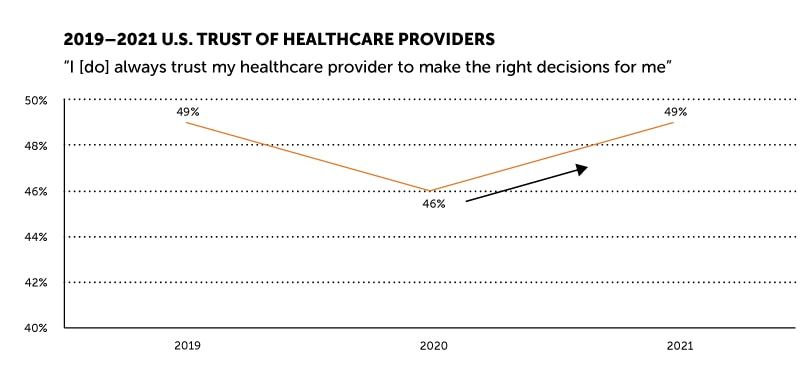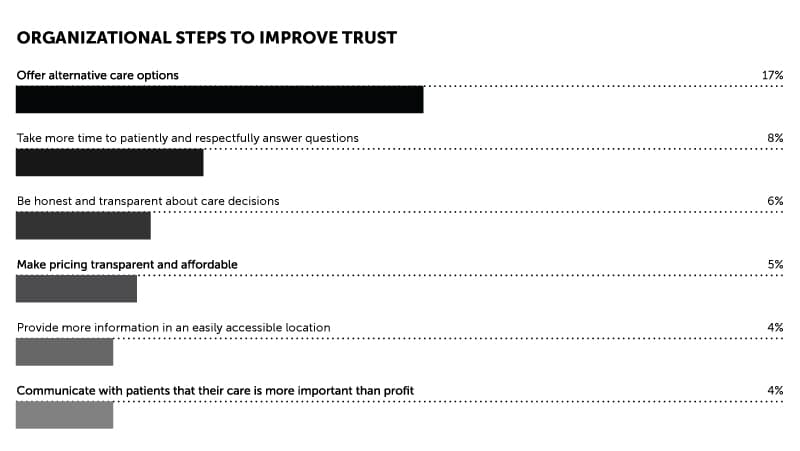Exploring Humanizing Brand Experience Vol 4 Report Findings: Don’t Lose Trust

In case you missed it, we recently released the latest edition of our Humanizing Brand Experience Report, available for download here. Here, we’ll dive deeper into a key finding from this year’s report: consumer trust—and what your brand needs to do about it.
Don’t Lose Trust: Understanding the Data
This may be one of the few good things to come out of the pandemic: consumer trust of healthcare providers is up. During a challenging, confusing, and often downright terrifying year, people turned to their doctors and care providers for expert guidance they could rely on. At a time when broader category engagement has softened, this is a meaningful positive.
 Consumer trust levels saw a minor—but meaningful—uptick during COVID-19
Consumer trust levels saw a minor—but meaningful—uptick during COVID-19
While trust levels are higher today than they were at the start of 2020, this isn’t the moment for brands to sit back and rest on their laurels. Even in the best of times, trust is a complex, multifaceted concept.
Building it takes more than a slick advertising campaign or a fancy new procedure, and it doesn’t happen overnight. In order to create lasting trust with your consumers, you need to walk the walk and prove yourself through consistent, humanized brand experiences—again, and again, and again.
 Consumers crave choice, and offering a variety of options is key to building trust and helping them feel involved with their health.
Consumers crave choice, and offering a variety of options is key to building trust and helping them feel involved with their health.
Consumers tell us that despite individuals’ declining engagement in their own health and wellness, they are now tuned in to healthcare brands more than before. And that means you need to pay more attention than ever to your words, actions, and experiences.
Strategic Implications
Trust is tricky: it’s hard to win and easy to lose. Plus, you can’t just tell people that you are trustworthy. You have to show it. So, despite gains this year, brands must take active steps not to let trust levels fall into decline. To maintain and build consumer trust, here’s what the data suggests you do:
1. Mind your Messaging
Healthcare information and decision-making can be overwhelming and confusing for people. The more transparent, clear, and simple healthcare providers can be when providing information, the more consumers will understand and trust what they have to say.
While there will always be a certain degree of complexity and medical terminology that can’t be avoided, committing to helping patients “translate” important information such as their diagnosis, care plan, and next steps is an essential part of building a strong relationship. Essentially, this tells people that you’re here for them (more on that later in our deep dive into Security in a future blog), and that they can trust you won’t leave them in the dark when it comes to their health.
Learn More: 3 Strategies for Building Consumer Trust (and what to do if you’ve lost it)
2. Bring Patients into the Decision-Making Process
Listening, understanding, and empathy are essential to building trust. And that means patient-provider interactions and decision-making must be more than just a one-way dialogue. Consumers want to be involved in their health, and they crave a sense of control and choice even beyond just the care interactions. We can thank other industries for retraining people on how much control they can potentially have over their brand choices. The more you can bring them along for the journey and involve them in different steps, the more they will trust your word and actions.
Having access to different choices (and a provider who is willing to talk through the pros and cons of each) helps consumers feel included. Make sure there is plenty of time for patients to ask questions and talk through different strategies, so that you can arrive on a solution together.

3. Don’t Be Afraid to Show Vulnerability
COVID-19 reminded us of the unpredictability and uncertainty of our world. With new updates and changes happening constantly, it’s impossible for anyone—even health experts—to predict the future.
But uncertainty doesn’t have to be a failure. In fact, it’s what makes us human. By acknowledging the unknown, leaving room for change, and ensuring a commitment to improvement, health systems can portray a sense of humanity that will further drive trust with consumers.
The improvement in trust is one of the bright spots of consumer engagement across the healthcare industry through the pandemic. How can we sustain this momentum as the other facets of engagement rebound?
So much of trust is built via the one-on-one experiences that we facilitate. By focusing on the right message, bringing people closer to health-related decision-making, and getting comfortable with vulnerability, you have the opportunity to perpetuate trust in your people, your organization, and the category as a whole.
Learn More: Ingredients for a Powerful Brand Positioning
In the next blog in this series, we dive into another key insight from our Humanizing Brand Experience Vol 4 report: Real Talk, Not Robots. In the meantime, feel free to reach out to us to continue this conversation or follow us on LinkedIn for content like this and more!



